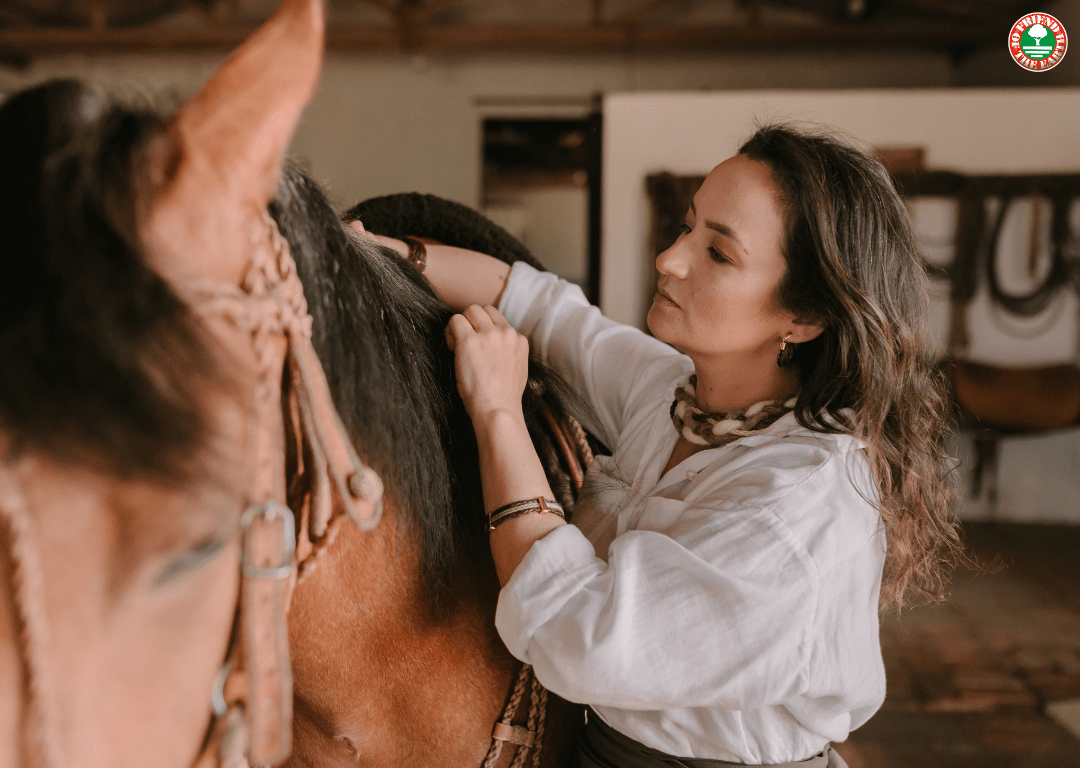«We forget that we belong to nature; we have become estranged from it. Our senses have fallen asleep. We are connected to the world and disconnected from our earth, weakening our creative capacity«, says Priscila Rebelo, founder of the Brazilian brand Crina.
With this assumption in mind, Crina designs jewels that are «an invitation to awakening.»
Crina’s jewelry is made by braiding Criollo horsehair, horses native to the Pampa biome of Rio Grande do Sul, Brazil. The mane yarns the brand uses to create the jewelry are scraps from the designer’s family’s Criollo horse farm.
The rest of the raw materials Crina uses for its jewelry are also scraps from daily activities in the rural environment, such as wool or seeds.
Bracelets, earrings, and necklaces are all handmade, «reinforcing the care and concern for the animals and people of the countryside. Impacting and honoring origins, regenerating the culture of manual labor in Southern Brazil«, Priscila Rebelo explains.
That is why Crina jewelry has been recognized and officially certified according Friend of the Earth sustainable fashion requirements.
A project of the World Sustainability Organization, Friend of the Earth, was launched in 2018 to promote sustainable farming practices and certify products from environmentally and biodiversity-friendly agriculture. Over the years, Friend of the Earth has become the leading international certification logo for agro-food and has also developed certification standards for non-food products and services, such as textiles, cosmetics, and tourism.
Friend of the Earth’s Sustainable Fashion program aims at selecting designers worldwide whose garments and accessories are made with sustainable materials and processed in a way that respects the environment and workers. Brands from around the globe are currently undergoing the audit process to obtain Friend of the Earth certification. Some have already been certified, such as Crina.
Crina’s differential is to bring healing processes. Horse shearing has the care and welfare of animals as its purpose. In addition, Crina uses waste materials from daily activities in the rural environment, which are not considered noble, introducing an innovation in the jewelry industry.
The process of shearing the mane is a necessary practice: in fact, the strong winds characteristic of the Pampa of Rio Grande do Sul tangle the hairs.
“The vegetation present in the Pampa biome, too, can cause damage to overgrown manes. «Carrapicho,» for example, is a plant whose seed has thorns. The thorns can wrap around the hairs and, if not removed, can cause skin injury to horses”, Priscila Rebelo comments.
On the other hand, the wool that Crina uses for the jewelry comes from Texel breed sheep from the family farm. This breed of sheep is predominant in the Costa Doce region of Rio Grande do Sul (subsistence farming) and has wool that is considered low to medium quality.
«As synthetic materials entered the market, this raw material became devalued, making its trade unprofitable and becoming waste. As a result, knowledge of its processing has been lost over time,» Priscila Rebelo explains.
«Including this fiber in our jewelry is a way to recover knowledge of the ancestral manual labor of wool care, generate an «alternative» source of income, and enhance the female workforce in the countryside.«
The seeds in Crina’s jewelry collections also come from reuse. They are waste from the property of the farming couple Sereni and Jolar Almeida, who has a forestry certificate for sustainable extraction of products from the Butia Odorata palm.
Crina’s jewelry tells stories and reveals emotional memories.
«They are designed for women and men who seek in jewelry symbols of power and affective memories of their origins,» says Priscila Rebelo.
«The horse is part of humanity’s evolutionary journey. It is a symbol of strength, freedom, and healing. In addition, horsehair threads are a means to reconnect with nature. In this sense, Friend of the Earth certification is critical because it legitimizes our process and attention to the environment.«




